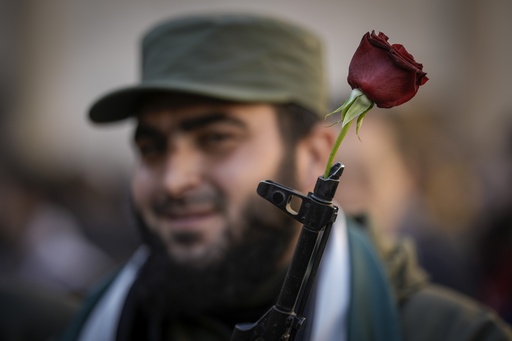DAMASCUS — The newly appointed security chief, Maj. Hamza al-Ahmed, made his arrival at the international airport in Damascus, accompanied by a team of armed fighters. Their presence marked a significant change in the atmosphere, as a few maintenance workers gathered around al-Ahmed, seeking clarity about their future under the rebels’ control.
These workers voiced long-standing grievances that had built up during President Bashar Assad’s regime. They expressed frustration over missed promotions, perks restricted to Assad loyalists, and threats of imprisonment for working too slowly. Concerns were raised about staunch Assad supporters among the airport staff who might attempt to regain influence when operations resume.
This moment signifies the initial stages of Syria’s transformative period following Assad’s unexpected regime change. The rebels are now the new authorities, and the population is experiencing a complex mix of emotions—an amalgamation of excitement for newfound freedoms, sorrow stemming from years of repression, and anxiety over the uncertainties that lie ahead. For many, the gravity of this transition brought them to tears.
Despite the tumultuous history, the country’s transition has remained relatively peaceful thus far, with only a handful of reports indicating acts of revenge or sectarian violence. Instances of looting have been managed effectively, and rebel fighters have shown a level of discipline. Daily life continued in Damascus without major disruption, with minimal visible military presence.
However, the situation remains precarious. The nation bears the scars of five decades of Assad family rule, resulting in a fractured society. Many families have suffered divisions due to the war, and countless former detainees carry trauma from their experiences. Economic conditions are dire, characterized by rampant poverty, high inflation, and considerable unemployment rates. Corruption continues to permeate everyday life.
Nevertheless, in this moment of change, there is a palpable desire among the populace to navigate the new landscape. Al-Ahmed addressed the airport employees, affirming, “The new path will have challenges, but we have committed to ensuring Syria belongs to all its citizens, and cooperation is essential.”
As the day progressed, remnants of the Assad regime were eradicated, with rebels storming a police station, tearing down images of Assad, and erasing official files. The security presence had shifted entirely to the rebels, who are now operating within the framework established during their governance of the Idlib region.
On this particular day, a small contingent of rebel police patrolled the station, handling complaints of petty crimes and neighborhood disputes. A frustrated woman reported her neighbors meddling with her electricity supply, and was advised to exercise patience until judicial systems could be reinstated. “Resolving issues will take time,” one officer remarked.
The administrators aim to emulate their governance structure from Idlib, but face the challenge of a significantly larger urban environment. Estimates suggest that around 4,000 rebel officers are deployed, with the majority based in Idlib, while talents and manpower in other areas remain comparatively low. The combined strength of the insurgents is estimated at roughly 20,000 fighters, predominantly rooted in conservative and rural backgrounds, many adhering to hardline Islamic ideologies.
The leading faction among them, Hayat Tahrir al-Sham, is working actively to dispel its al-Qaida affiliations, striving to foster an inclusive and tolerant society for Syria’s diverse communities. Yet skepticism still lingers among the Syrian people.
One resident of Damascus, Hani Zia, expressed concern regarding reports of violence against minorities and retaliatory acts, stating, “Those on the streets do not represent our interests.” This wariness is reflected in the cautious revival of some businesses, such as restaurants quietly resuming alcohol service, gauging public sentiment.
In a café within the Old City’s historical Christian area, some patrons nervously enjoyed their drinks as a group of rebel fighters passed. When minor disputes occurred, the rebel police intervened decisively to maintain order.
Among the populace, voices of dissent exist against the rebels’ ideologies; figures like Salem Hajjo, a theater instructor involved in the 2011 protests, admire the rebels’ administrative capacities but hold reservations about their beliefs. He, however, anticipates that citizens will have a meaningful role in shaping the new Syria.
After the regime’s fall, there was initial chaos during celebrations, with gunfire echoing through the streets. In an effort to maintain stability, Hayat Tahrir al-Sham promptly instituted a nighttime curfew and prohibited celebratory gunfire while deploying their fighters to safeguard properties.
As the dust settled, citizens took to the streets to seek out missing relatives in the regime’s detention centers, alongside rebel fighters who, too, were looking for loved ones. The atmosphere became charged with hope and pride as gunmen engaged with children, showcasing a more approachable side, posing for photos with citizens, and affirming a sense of communal victory and optimism.
The interim government has emphasized the need to restore normalcy swiftly. Efforts to regain functionality at the airport have begun, with maintenance crews evaluating aircraft and cleaning teams working to dispose of debris left behind in the airport.
Murad, a cleaner earning a meager salary of $15 a month, articulated a hope for change, stating, “Restoring our environment will take considerable effort.”
Home Syria's First Week: Rebels Aim for Stability as Citizens Pledge to Raise...



